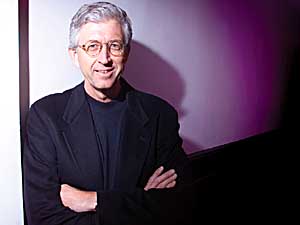Social Thought Chairman Pippin receives new award for scholarship
By Seth SandersNews Office
 Robert Pippin, the Raymond W. and Martha Hilpert Gruner Distinguished Service Professor and Chairman of the Committee on Social Thought and Professor in Philosophy and the College, will further his scholarship with a new award given by the Andrew W. Mellon Foundation. |
Robert Pippin, the Raymond W. and Martha Hilpert Gruner Distinguished Service Professor and Chairman of the Committee on Social Thought and Professor in Philosophy and the College, has been selected as one of five recipients of a new fellowship, the Mellon Distinguished Achievement Award.
The award, given by the Andrew W. Mellon Foundation, is intended to enable notable scholars in the humanities to pursue their work under especially favorable conditions and to underscore the decisive contributions the humanities make to the nation’s intellectual life. The award is granted to scholars who have made major contributions to their own disciplines, whose influence may well have extended more broadly to other fields and whose current work promises to make significant new advances through both teaching and research. This award is earmarked entirely for scholarship and provides its recipients with $1.5 million over a three-year period.
A professor at the University since 1992, Pippin has focused his work on modern German philosophy, which is reflected in books such as Kant’s Theory of Form, Hegel’s Idealism and Idealism as Modernism: Hegelian Variations. Underlying this work is what he described as the problem of “how to understand what’s happened to us since the 16th century.” He explained his interest in German philosophy as connected to its effort “to understand European modernization. These attempts reflect an anxiety about the nature of the modern tradition and the attempt to create a secular foundation for modern ethical life.”
For Pippin, many of the most prominent recent intellectual currents appear as replays of older concerns. In the introduction to the second edition of his Modernism as a Philosophical Problem, he writes that the suspicion of the Enlightenment and the West that is typical of new historicism, and cultural and postcolonial studies is “a phenomenon that should be understood as largely repetitive. A culture of melancholy, profound skepticism and intense self-criticism had become official high culture and the dominant academic one in the European West.” Pippin said this culture has begun to repeat itself “in new forms, forms now hostile, paradoxically, even to the ideas of high culture, criticism, skepticism or enlightenment” on which it depended.
The book, he explained, reflects his view that “we don’t yet understand what happened to us” during the Enlightenment. “There’s no reason to think that the accounts of the Enlightenment that have settled in are right.” Therefore, his goal was “to re-narrate how it happened, because the positions currently warring don’t represent the actual options or reflect the transition to modernity well.”
Terry Pinkard, professor of philosophy and German at Northwestern University, said of Pippin’s contribution to scholarship, “He’s responsible for a turning point in American philosophy: German philosophy, which had been regarded as very marginal, is starting to seem very central. I’ve been tremendously influenced by Pippin’s work. He’s one of the people I most enjoy reading, and if I see an article of his, I read it immediately. Because he recast a whole series of problems that a lot of us thought we understood already, he showed new ways to see things, interconnections between thinkers we hadn’t seen.”
Pippin intends to use his prize money to work on three projects. The first is a study of Hegel’s practical philosophy and his theory of freedom. For Hegel, “freedom was not just a question of free will but the freedom of persons in relation to other persons––freedom is a form of social life.” The second project is a book titled The Erotic Nietzsche: Philosophers Without Philosophy. It will detail how Nietzsche’s misgivings about modern secular democratic society relate to the nature of human desire, particularly philosophical desire. Nietzsche, explained Pippin, “doesn’t believe in philosophy but in the philosophic life.” The third project is a book titled Modern Aesthetics After the Beautiful, which will focus on the shift from the criterion category of beautiful to that of the sublime and the conceptual in late 19th- and early 20th-century art.
Because of the way the Mellon prize is structured, it also will allow Pippin to create intellectual and work opportunities for others. The prize will pay both his salary and benefits for three years, two of which must be spent in residence. The remainder of the sum is to be used to support research and intellectual dialogue at the University.
Pippin is considering plans to support graduate student research, postdoctoral fellowships, visiting professorships and perhaps reinvigorating a recent program in the Committee on Social Thought where writers would visit to teach literature classes.
Mellon Foundation Chairman Hanna Gray, President Emerita and the Harry Pratt Judson Distinguished Service Professor Emerita in History said, “The Andrew W. Mellon Foundation has, from its inception, been dedicated to enabling first rate scholars and institutions to cultivate and to advance humanistic learning and understanding. These new awards are made in recognition of individuals who have excelled in that mission and whose work and influence continue to enrich the broader community of humanistic
![[Chronicle]](/images/small-header.gif)